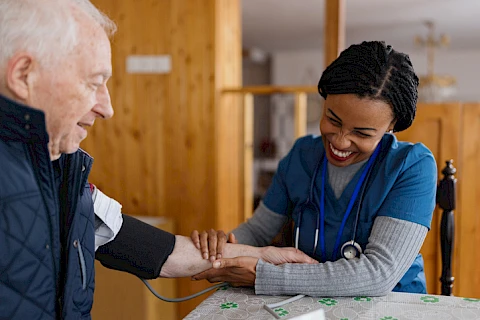
Routine health screenings are vital for maintaining good health as we age. This is especially true for seniors, who may face an increased risk of various medical conditions. For Canadian seniors and their caregivers, understanding the importance of regular check-ups can make a significant difference in quality of life. Early detection and prevention of potential health issues through routine screenings can help seniors stay healthy and active longer. Senior Helpers will break down the value of staying up to date on your health.
Why Routine Health Screenings Matter
Routine health screenings can help detect health issues early, often before symptoms appear. Early detection can lead to more effective treatment and better outcomes. Regular check-ups can positively impact the quality of life and longevity for seniors. Knowing that health issues are being monitored and managed provides peace of mind for both seniors and their families.
Essential Health Screenings for Seniors
Certain health screenings are essential for seniors. Monitoring blood pressure is important because high blood pressure can lead to serious health problems such as heart disease and stroke. Seniors should have their blood pressure checked at least once a year.
Cholesterol plays a significant role in heart health. Seniors should have their cholesterol levels checked every 4-6 years or more often if they are at risk of heart disease. Fasting may be required for a cholesterol test, so follow your healthcare provider's instructions.
Cancer Screenings
Cancer screenings can detect cancers early when they are most treatable. Common types of cancer screenings include:
- Breast cancer: Women should have mammograms every 2-3 years, starting at age 50.
- Prostate cancer: Men should discuss screening options with their doctor, generally starting at age 50.
- Colorectal cancer: Screenings are recommended every 2 years for adults aged 50-74.
- Skin cancer: Annual skin exams can help detect any unusual changes.
Preparation for these screenings varies. Follow specific guidelines provided by your healthcare provider for each type of screening.
Diabetes Screening
Detecting early signs of diabetes is vital for managing the condition and preventing complications. Seniors should have a diabetes screening every 3 years or more often if they are at risk. A typical test is the fasting blood sugar test, which requires fasting beforehand.
Bone Density Test
Bone density tests are important for detecting osteoporosis, a condition that weakens bones and makes them more likely to break. Women over 65 and men over 70 should have a bone density test every 2 years. To prepare, avoid taking calcium supplements before the test.
Preparing for Health Screenings
Preparing for medical appointments can help ensure accurate results and make the process more efficient. Keep a health journal to maintain a record of your health history, medications, and any symptoms you may be experiencing. Always follow instructions provided by your healthcare provider, such as fasting or avoiding certain medications before a test.
Before your appointment, prepare a list of questions to ask your healthcare provider. This will help you better understand your health status and any recommended screenings. Don't forget to bring identification and insurance information to ensure a smooth check-in process.
Contact Senior Helpers for Compassionate Senior Care
Routine health screenings are a key component of health maintenance for seniors. These screenings can help detect health issues early, improving the chances of successful treatment and enhancing quality of life. If you or a loved one are due for a health check-up, schedule your screenings today. For those living in Canada, Senior Helpers is here to assist. Contact us today to learn more about our senior care services.